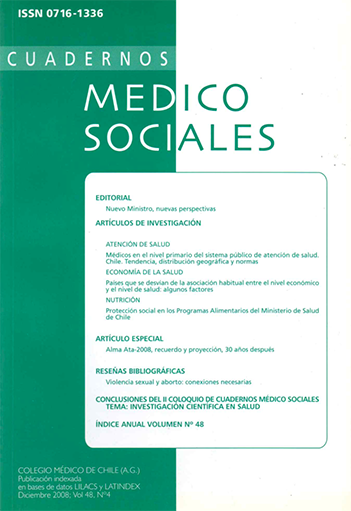Welfare Food Programs in the Ministry of Health of Chile
Keywords:
Food Programs, Social Protection, Feeding-Nutritional InterventionAbstract
Food programs have existed in Chile since over half a century, they have been developed as part of the health protection policies, specially for the more vulnerable groups, regarding, initially the mother and child binomial and lately, the senior citizens. One of the main objectives has been to maintain and/or improve the nutritional state of these groups and currently, the decrease of the risk of developing non communicable chronic diseases associated to diet and a sedentary lifestyle has been added. The National Programs of Complementary Food (PNAC) is a free universal benefit, established by law for all children and pregnant women in the country, independent of their health insurance system. This programme integrates the State’s health protection policy and the comprehensive development of the mother and child population and has been adapted to the epidemiological and demographical changes as well as to the progress in the scientific-technological knowledge in the area of food and nutrition. Nine years ago, the senior citizens (the elderly) were added and since 2003, the extreme premature babies and those with Phenylketonuric. Nowadays the Food Programs of the Ministry of Health, (PNAC) as part of the nutritional intervention strategy throughout the life cycle and the Programs of Complementary Food for Seniors (PACAM) which forms part of the activities of healthy aging promotion, compose one of the most significant feeding- nutritional intervention in Chile which is a fundamental contribution to achieve the country’s sanitary goals.
Downloads
Downloads
Published
How to Cite
Issue
Section
License

This work is licensed under a Creative Commons Attribution-NonCommercial-ShareAlike 4.0 International License.


